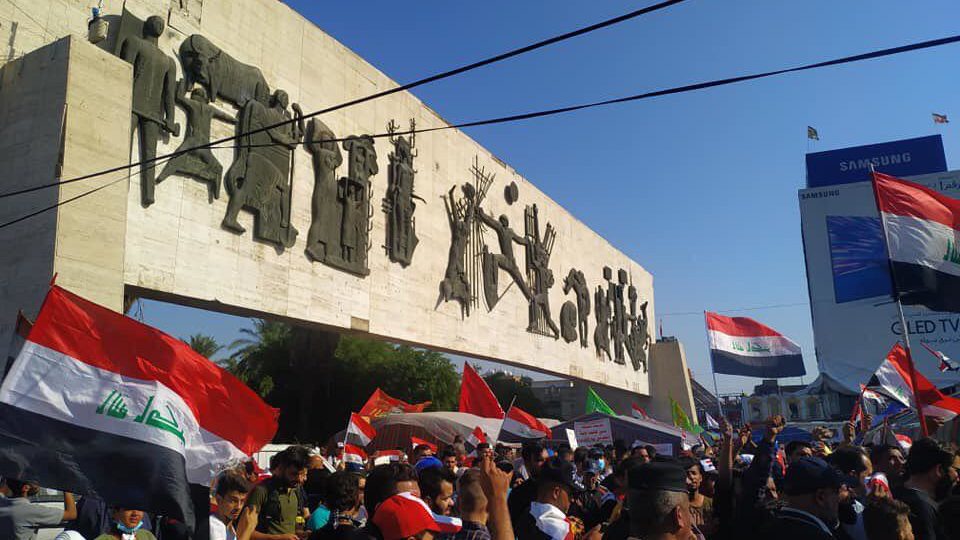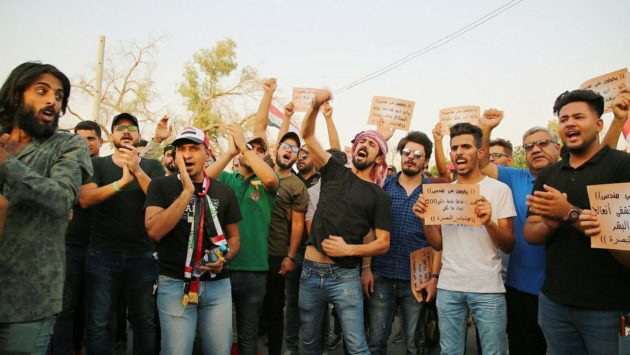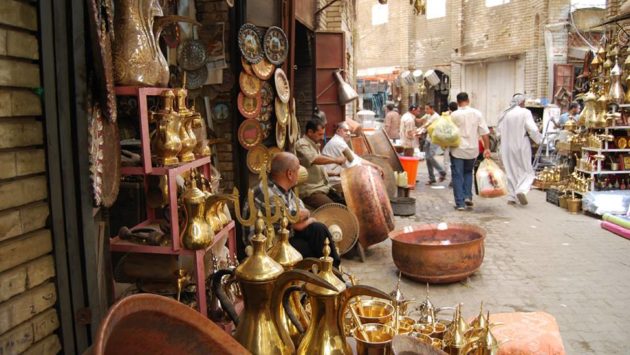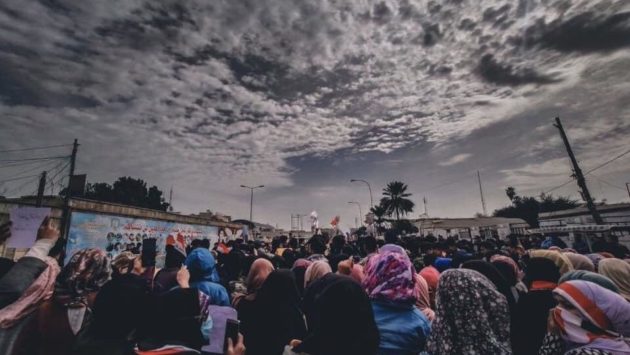Civil Society Groups Meet in Erbil to Identify Solutions and Recommendations for the Crisis in Iraq
Civil society organizations condemn the repression of peaceful protesters and call for authorities to respect freedom of opinion and expression.
32 civil organizations representing all Iraqi provinces held a meeting in Erbil as part of the project, ‘Middle East Forum 2019 – End Wars and Create Peace’. Organized by the Middle East Research Institute (MERI) in cooperation with the People’s Relief Organization (PAO), the project is now carrying out a detailed study of the current situation in Iraq with the aim of developing a roadmap to resolve the ongoing crisis.
The undersigned human rights organizations denounce the use of violence by Iraqi security forces and other unknown forces against peaceful demonstrators. The nonviolent protesters came out in early October to raise their voices against corruption and the looting of public money. They demonstrated to show that they will no longer accept the lack of the most basic services in all sectors. They gathered — peacefully and nonviolently — in cities and towns throughout all of Iraq to call for their constitutional rights, and this free expression led to the death of dozens of young people, cut down in the prime of their lives. Thousands of others have been injured, large numbers of demonstrators have been arrested without cause, and journalists have been attacked, their cameras and equipment destroyed.
These excessively violent measures are incompatible with articles in the Iraqi Constitution which guarantee freedom of opinion and expression in all its forms, as well as with the International Bill of Human Rights, ratified by Iraq.
The undersigned organizations, while strongly condemning the forceful repression of demonstrators, also condemn third-party protests by external groups who have been publicly demonstrating as a way to fuel the already unstable situation and contribute to the violence. These protests are not representative of the spirit, goals and methods used by the early demonstrators, but are shamelessly escalating the chaos to engage in murder and increase militarization, thus derailing the peaceful, legitimate and rightful work that characterized the movement at its start.
The undersigned civil society organizations propose adopting a stance of civil peace, national unity and a propose and roadmap for real reform. This is the best option, and in fact is the only one that can put an end to the suffering of the Iraqi people.
Their reasoning is is based on the belief that the current situation in Iraq is the result of post-2003 political forces who continue to try to control and use public utilities for their own private benefit, rather than take their public responsibilities seriously and respond to the needs of citizens. They have adopted and perpetuated a political system based on sectarianism and partisan quotas, which ignores the Constitution when it’s convenient or simply enforces it selectivity, according to party interests. The extent of the corruption is wide reaching, as is the resulting lack of social justice.
In recent years, there has been:
- a steady rise in unemployment and poverty,
- a lack of basic services for Iraqi citizens,
- a decline in provisions for health and education,
- a security situation which teeters on the edge of chaos,
- a reckless use of weapons by the state,
- an ongoing presence of multiple armed forces, each with different loyalties, which purchase arms using political money and use it to control the state’s resources.
The civil society groups who met in Erbil identified a number of immediate and long-term solutions, the most important of which is the reform of the current political system. The quota system must be abolished through the enactment of a new and fair electoral law. There must also be a new independent electoral commission, a robust and effective opposition, and the Constitution should be amended to ensure justice for all, for instance, functional social and health security laws should be enacted, and the judicial system should be reformed. The system should include public prosecution and supervisory agencies. It should abolish opaque centralized bureaucracies and develop instead a decentralized administration which would allow for clarity at the local level. The new government must guarantee that rule of law be respected, and officials and policy-makers should work for economic reform leading to a fairer system. Integrity and transparency must be the guiding principles in all the above reforms.
The following are some concrete solutions and recommendations that came out of Erbil. Civil society organizations call upon the Iraqi government to:
1.) fulfill its obligations to guarantee, respect and promote human rights, in particular the freedom of peaceful demonstration and expression of opinion.
2.) conduct a free and impartial investigation into the killings of demonstrators and bring those responsible to justice as soon as possible. In this, the investigation cannot follow along the lines of past ones which were marred by procrastination and lack of accountability.
3.) release immediately all peaceful protesters.
4.) refrain from all use of prohibited materials (gases and other weapons) and abide by international standards if seeking to disrupt sit-ins and demonstrations.
5.) lift the ban on the internet and allow the media and its employees to operate freely, guaranteeing the right of citizens to access information, abolish curfews and any other restrictive practices that limit the freedom guaranteed to Iraqi citizens.
6.) cease from issuing irresponsible and inflammatory statements which aggravate the situation and escalate violence.
7.) work — specifically the Ministry of Foreign Affairs — regionally and internationally to stop all negative interference in the internal affairs of Iraq, and support projects and efforts to promote civil peace and social cohesion.
8.) encourage all political parties to take responsibility for the gravity of the current situation and agree to come together at a table with all actors to discuss possible ways forward which respect the Iraqi Constitution and which respond honestly, respectfully and immediately to the demands of demonstrators.
9.) appeal to national and international humanitarian and human rights bodies and institutions so that they continue to monitor violations and submit reports, thereby ensuring that Iraqi state institutions respect the Constitution as well as all conventions and treaties ratified by Iraq.
10.) encourage the signatory organizations to engage in legitimate, peaceful popular protests and refrain from the use of all violence in response, thus preserving the peace.
The following mechanisms are recommended:
1. Form an independent inquiry commission which includes representatives from both national parties and from the United Nations, who can observe and investigate crimes and violations against demonstrators and issue an official report on the killing and injury of thousands of peaceful demonstrators.
2. Form a crisis cell comprised of the presidents of the the Republic, the Council of Ministers, Parliament, and the judiciary along with representatives from non-governmental bodies, including trade unions and human rights NGOs to track the current situation, empowered to take appropriate and rapid decisions in light of the escalation of the crisis and the demands of the demonstrators
3. Establish a third neutral team to mediate between the demonstrators and the government and begin a serious and thoughtful dialogue which can ensure that the Iraqi people are heard and that a roadmap is set out to navigate problems and issues that may arise in the future.
Conclusion:
Civil society organizations in Iraq seek to contribute actively to the resolution of the ongoing crisis that has recently materialized.
Civil society organizations believe that the nonviolent October uprising and popular protests can play a strategic role in raising the awareness of citizens on the importance of civil participation to achieve civil peace, national unity and social justice.
Civil society organizations call for an inclusive and public debate with participation from all political parties, varied communities, and other national forces which will help to ensure real reform and serve the goal of civil peace.
Civil society organizations emphasize the necessity of creating a sound economy which uses all available means to combat poverty and unemployment.
Civil society organizations see themselves as key partners in addressing the political, social and economic challenges of Iraqi society and must be involved as watchdogs on the process of reform and community peace.
Signatories:
- Baghdad Women Network
- Ur Organization for the Culture of Women and Children
- Thar Development Center
- The Observer Human Rights Center
- Alliance of Iraqi Minorities Network
- Kurdish Human Rights Organization
- Kurdistan Economic Development Organization
- The Organization of the Defense of the Rights of Journalists
- Harikar NGO
- Iraqi Institute for Human Rights
- Peace and Freedom Organization
- Yezidi Organization for Documentation
- Ghasin Al-zaiton Organization for Youth
- Iraqi Youth Solidarity Association
- Assembly of Al-Inbithaq for Development and Economic Development
- Civil Development Organization
- Iraqi Enterprise for Growth and Development
- Kurdistan Human Rights Organization
- Zakho Small Villages Organization
- Women Empowerment Organization
- Saba Center for Studies and Human Development
- Hannah Youth Organization
- Yaman Foundation for Humanitarian Affairs
- Al-Nahrain Foundation to Support Transparency and Integrity
- The Rawanka Foundation
- Development Research Institute
- Organization of Studies and Research
- Association of Human Rights Trainers
- Hammurabi Human Rights Organization
- Middle East Research Institute
- Public Aid Organization




